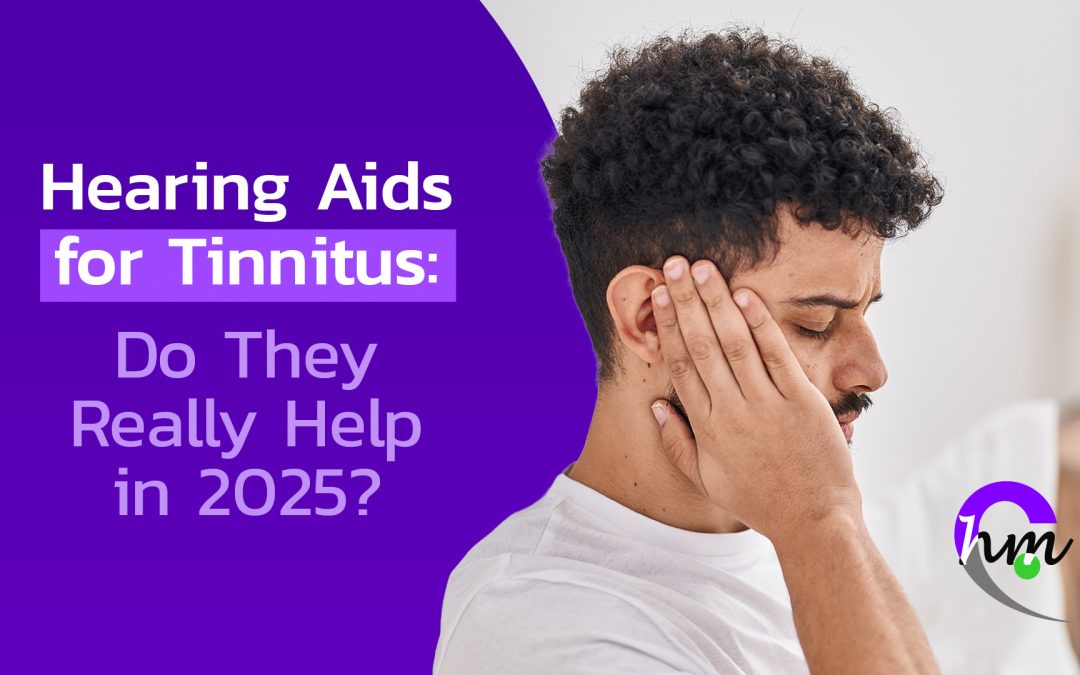Hearing aids for tinnitus are one of the most commonly recommended solutions for people living with ongoing ringing, buzzing or humming in the ears. But do they actually work? The short answer is yes – for many people, hearing aids can significantly reduce the perception of tinnitus, especially when hearing loss is also present. In this article, we’ll explain how hearing aids help tinnitus, who they work best for, and when to consider professional support.
What Is Tinnitus?
Tinnitus is the experience of hearing sounds that aren’t caused by an external source, most often described as ringing in the ears, though it can also sound like buzzing, hissing or whistling. It can be constant or come and go, and it affects approximately 1 in 3 Australians at some point in their lives.
While tinnitus is often linked with hearing loss, it can also be triggered by:
- Exposure to loud noise (e.g. concerts, machinery)
- Age-related hearing decline
- Stress or anxiety
- Ear infections or blockages
- TMJ (jaw) disorders
There is no single cure for tinnitus, but there are several management strategies, and for many, hearing aids for tinnitus play a central role.
How Do Hearing Aids Help with Tinnitus?
If you’re wondering whether hearing aids can actually help, the answer lies in how the brain processes sound. For most people with tinnitus and hearing loss, the brain is trying to “fill in” missing sound information – and in doing so, creates internal noise.
Hearing aids work in two key ways:
- Amplifying external sounds, which helps mask the internal ringing and reduces the contrast between silence and tinnitus
- Stimulating the auditory system, which reduces the brain’s need to “create” phantom sounds
Many modern hearing aids also include built-in tinnitus maskers, such as soft background sounds or white noise, which can be customised for your comfort.
Are Hearing Aids for Tinnitus Right for Everyone?
Hearing aids are most effective for people who have both tinnitus and mild to moderate hearing loss. In these cases, treating the hearing loss often leads to a noticeable reduction in tinnitus symptoms.
However, they may be less helpful for people with:
- Normal hearing thresholds
- Severe tinnitus with no associated hearing loss
- Tinnitus triggered solely by stress or medical conditions unrelated to hearing
That’s why it’s important to book a proper hearing assessment before making any decisions. At Hearing Matters, we help clients understand the underlying cause of their tinnitus and explore whether hearing aids are an appropriate next step. We can arrange a free hearing aid evaluation to determine what solution you need.
Other Treatment Options Worth Mentioning
While this blog focuses on hearing aids for tinnitus, it’s important to know there are other evidence-based options, particularly for those with no measurable hearing loss.
These include:
- Tinnitus Retraining Therapy (TRT)
- Cognitive Behavioural Therapy (CBT)
- Sound therapy using standalone devices or apps
- Relaxation strategies such as mindfulness or meditation
Tinnitus is closely linked to emotional wellbeing. If you’re experiencing stress, anxiety or poor sleep as a result of tinnitus, this population-based study published by the National Library of Medicine explores the strong connection between tinnitus and mental health, and why a holistic approach is often necessary.
What to Expect from a Hearing Assessment
Before any treatment plan is recommended, a hearing assessment is crucial. At Hearing Matters, we offer comprehensive hearing assessments for adults, and eligible individuals qualify for a free hearing aid evaluation to test how well they respond to sound amplification.
During your consultation, you’ll receive:
- A full hearing test
- A discussion of your symptoms and hearing goals
- Recommendations tailored to your needs
- An opportunity to explore hearing aid options, including tinnitus masking features
Why Choose Hearing Matters?
As a proudly independent hearing clinic in South Australia, Hearing Matters offers a personalised, no-pressure approach to hearing care. Whether you’re experiencing tinnitus, hearing loss, or both, our team of qualified audiologists can help you find the right solution, without the sales pitch.
We offer:
- Government-accredited services
- Free hearing assessments for eligible adults
- Hearing aids with built-in tinnitus support features
- Flexible payment options and transparent pricing
- Ongoing support and adjustments to keep your hearing on track
We don’t just fit hearing aids, we support people on their hearing health journey, every step of the way.
Ready to Take the First Step?
If you’re living with ringing in your ears and wondering if hearing aids for tinnitus could help, the best place to start is with a professional hearing assessment.
👉 Book your free hearing assessment with Hearing Matters and get expert advice on whether hearing aids could improve your tinnitus and your quality of life. There’s nothing to lose, and possibly, a lot to gain.
